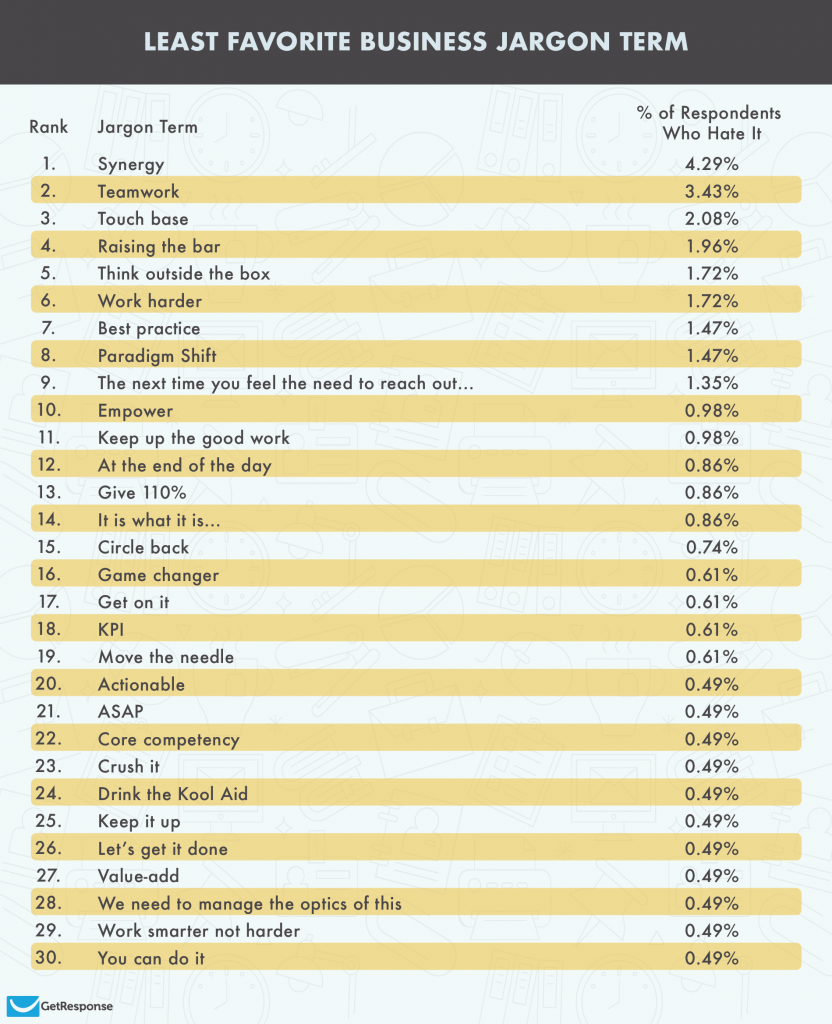
I guess if you work in any kind of business setting, you’ve probably heard or even used at least a few jargon terms. No matter if you work in IT, finance, legal or HR department, there are many cliché phrases that have recently become overused and that sound just ridiculous to people outside your business. Every industry has its own jargon, acronyms and some kind of slang.
Do it ASAP! It’s simply a BAU scenario, you can do it! You need to think outside the box. This feature is a game changer! Hey, you should go after the low hanging fruit, you know! Let’s touch base offline. We hire only ninja developers. There was even a survey regarding the most hated jargon phrases in the workplace are.

You have probably heard all those business buzzwords while listening to corporate presentations. From executives to regular employees. But how does the exaggerated jargon affect communication in the workplace? Is it helpful or rather disturbing?
The lack of clear communication can destroy an organization
Let’s start with the basics. Without clear and concise communication organizations may very likely struggle with huge problems. It starts at the top. If the top management finds it hard to receive information from the lower management, it will be hard for them to manage the whole company. They will have poor information and they will base lots of strategic decisions upon it. And vice versa. If the lower management isn’t able to understand instructions coming from their supervisors, they will collapse. They will be executing goals that don’t match the ones stated by the top management.
Moreover, according to a study [1] conducted by Tamer A. Awad and Suhaila Alhashemi, organizations will not exist if there is no appropriate communication between superiors and coworkers. The research found that there is a positive relation between clear communication and healthy relationships between superiors and coworkers. And those, of course, impact the coworkers’ motivation, commitment to an organization and job satisfaction.
But let’s get back to jargon and business buzzwords which affect communication.
Meaningless expressions
There are many overused and misunderstood phrases people use – “thinking outside the box”, “customer-oriented solutions”, “synergy”, “teamwork”, “sustainability”, etc. The more we use those terms, the less meaningful they become. If you see each company is thinking outside the box, who in fact is actually doing that? Is any kind of a problem solving meeting really a brainstorming session?

Using too much jargon can make your speech vague. There is temptation among business people to add words, like “proceed” or “scalable” to their presentations because they can make them sound smarter. But in reality people can find it meaningless. They’ve just heard all those phrases before and they are unconcerned about them.
More jargon, less trust
Another problem with using jargon is that it can create boundaries between people. Managers use jargon and terms that other coworkers are not necessarily familiar with. And so, people working in various departments don’t necessarily understand each other’s jargon.
It becomes a serious problem when managers share their intentions or communicate some organizational change. Cutting costs, creating new departments or any kind of restructuring actions. If information is communicated in an ambiguous manner, it negatively impacts employees. According to another study [2], if people cannot see clear intentions of their managers, they become suspicious and they lose trust:
“Employees will have difficulty in understanding whatever is being communicated to them from the top management, as a result, they will tend to feel greater job insecurity and distrust the employers as well as the entire organization.”
As you can predict, the lack of trust and feeling insecure can impact other factors, like job satisfaction and job performance. It’s hard to focus on performing well and developing your skills if you don’t feel your role is important in the company.
Hiding the truth
In their study [3], Jochim Hansen and Michaela Wänke examined the impact of concrete language on the judgments of truth. And the outcome was that using abstract language leads listeners to believe that a speaker is lying. That’s not a surprise. Some people use smart or rather vague slogans to hide the truth. To avoid further questions. They hope that if a statement is vague or sophisticated, nobody will be eager to ask follow-up questions. It’s easier to use beautiful phrases instead of confirming the ugly truth.
Becky Gaylord presented muddled corporate statements she found in press releases and rewrote them to more meaningful sentences. Here’s one of my favorite:
“The new company and its management team has invested a substantial amount of their time and effort in laying the groundwork for the company’s unique value proposition to its potential customer base while setting the stage for developing its brand of products.”
which just means:
“The new company is developing its marketing plan.”
It was probably supposed to sound smart and professional but it ended up being confusing. Jargon and empty words evade facts and confuse people. Unclear phrases and statements may undercut the credibility of even the most professional company.
Isolation & irritation
Putting too much jargon and acronyms into your speech or presentation can also irritate your audience. Because who actually likes listening to empty phrases? Moreover, it can separate a speaker from others if there is someone among the audience who doesn’t understand the meaning of a jargon phrase or understands it differently.
“(…) employees feel that they are being looked down by their managers as a result of the different classes they belong to, they will tend to lose their sense of belonging and faith in the organization hence, they will become demoralized.”
People who don’t understand what a speaker talks about, feel worse. They will start to feel incompetent and quickly tune out. Communication is only effective when both parties speak the same language. If you use jargon too often, you’ll break the connection between you and your listeners.
Summing up
When you work in a corporate environment, it’s easy to fall into the trap of using too many buzzwords and jargon phrases. It’s easy to become just another pretentious specialist. I always wanted to understand whether jargon actually works for your advantage or not.
And the conclusion is that using jargon can be dangerous for your credibility and relationships with other people. If you really need to use buzzwords and jargon, use it sparingly.
References
[1] Tamer A. Awad, Suhaila Alhashemi. International Journal of Islamic and Middle Eastern Finance and Management 5(2). June 2012. Assessing the effect of interpersonal communications on employees’ commitment and satisfaction.
[2] Ngueviuta Patoko, Assc. Prof. Dr. Rashad Yazdanifard. American Journal of Industrial and Business Management, Vol. 4, (7):333-336. January 2014. The Impact of Using Many Jargon Words, While Communicating with the Organization Employees.
[3] Jochim Hansen, Michaela Wänke. Personality and Social Psychology Bulletin 36(11):1576-88. November 2010. Truth From Language and Truth From Fit: The Impact of Linguistic Concreteness and Level of Construal on Subjective Truth.